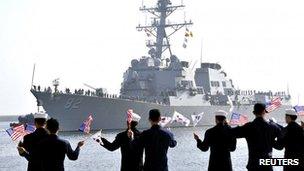US flies B-52s over South Korea amid North rhetoric
- Published

The US and South Korea are conducting annual military drills
The US is flying nuclear-capable B-52 bombers over South Korea, in what it says is a response to escalating North Korean rhetoric.
US officials said the B-52 flights demonstrated "extended deterrence capabilities" amid rising tension on the peninsula.
The aircraft, which can also carry conventional weapons, flew on 8 March, with another mission set for Tuesday.
Regional tension remains high after the North's third nuclear test last month.
This is not the first time that B-52 bombers have been used as part of regular military drills between the US and South Korea.
"We're drawing attention to the fact that we have extended deterrence capabilities that we believe are important to demonstrate in the wake of recent North Korean rhetoric," US Pentagon press secretary George Little said.
"As North Korea threatened to attack South Korea with nuclear weapons, the exercise involving B-52s is meaningful, as it shows US commitment to provide its nuclear umbrella on the Korean peninsula," said Kim Min-seok, spokesman for South Korea's Defence Ministry.
US Deputy Defence Secretary Ashton Carter affirmed this commitment on Monday during a visit to Seoul.
'Wasted resources'
The US last week also announced plans to boost its own missile defences in the face of a growing threat from North Korea, a move over which both China and Russia have expressed concern.
A spokesman for China's Foreign Ministry said it would "intensify antagonism", rather than improving regional stability.
The United Nations imposed fresh sanctions against North Korea following its nuclear test on 12 February.
Pyongyang has responded with strong rhetoric to this and the US-South Korea joint military drills, which it bitterly opposes.
It says it has scrapped the Korean War armistice and ended non-aggression pacts with Seoul. It has also cut off a hotline that connects the two countries.
The two Koreas remain technically at war because the 1950-53 conflict ended in an armistice, not a treaty.
South Korea says North Korea cannot unilaterally dissolve the armistice and has called on Pyongyang to tone down its language.
South Korean President Park Geun-hye on Tuesday called for North Korea to take a different approach.
"North Korea is wasting resources for nuclear development while its people are living very difficult lives," she said.